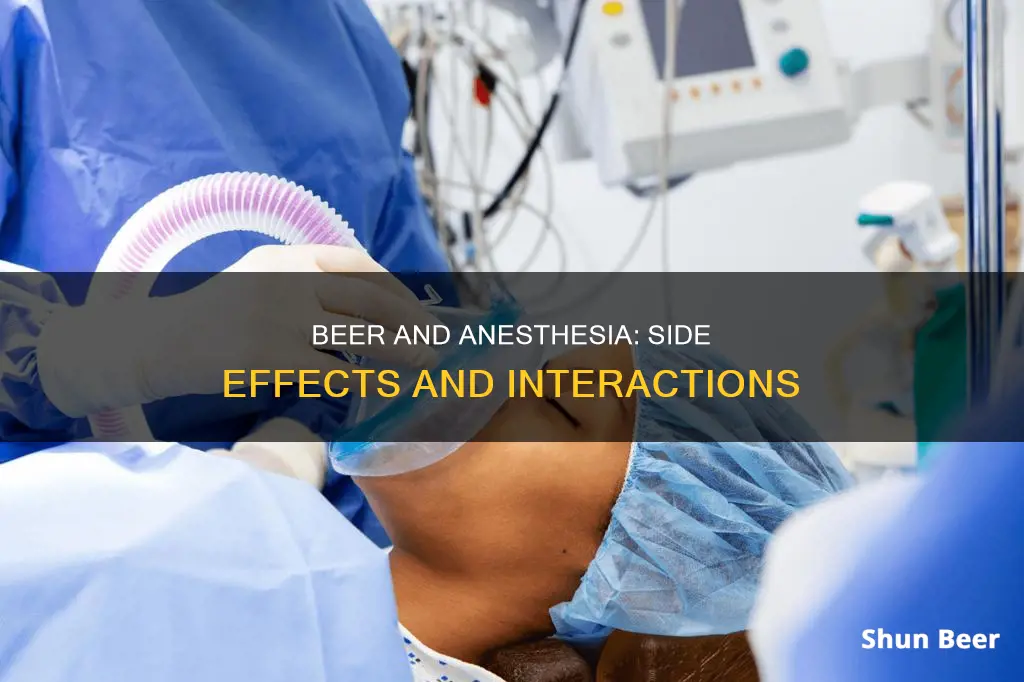
Drinking alcohol before surgery is a major health risk and can lead to serious complications during and after the procedure. Similarly, drinking alcohol after surgery can also be dangerous. Alcohol interferes with the blood's ability to clot, which can make incisions and controlling blood loss during surgery difficult. This can lead to a longer recovery stage. Alcohol also weakens the immune system, increasing the risk of infection, and interacts with medication, causing a bad reaction or reducing effectiveness. It is generally recommended to avoid drinking alcohol for at least 48 hours before surgery and for at least two weeks after, or until you have finished taking any prescribed medication. With this in mind, what are the side effects of drinking beer after anesthesia?
What You'll Learn
- Anaesthesia and alcohol both suppress breathing, heart rate and circulation
- Alcohol can cause issues with blood clotting, which is necessary to stop blood loss during surgery
- Alcohol can negatively interact with medication, including painkillers and antibiotics
- Alcohol can increase the risk of infection at the surgical site
- Alcohol can cause post-operative swelling, which can tamper with the healing process

Anaesthesia and alcohol both suppress breathing, heart rate and circulation
General anaesthesia involves powerful drugs that suppress functions such as breathing, heart rate and blood circulation. Alcohol affects the same body systems. The liver may not be able to keep up with metabolising all these substances. This can lead to nausea and vomiting, which may increase the risk of aspiration (inhaling vomit), which can be fatal.
The anaesthesiologist may need to adjust the dosage if you have recently consumed alcohol. A higher dose of anaesthesia can increase the risk of cardiac events, especially if you have pre-existing heart problems.
Any surgery involves some bleeding. The body stops blood loss by clotting. Alcohol can thin the blood and interfere with this process, increasing the risk of uncontrolled bleeding. If you take blood-thinning medication or have a clotting disorder, this risk is even greater.
Alcohol can also cause dehydration, which can negatively impact the skin and prolong recovery. It is important to stay hydrated to aid the healing process.
Drinking Beer at Horny Corner: Is It Allowed?
You may want to see also

Alcohol can cause issues with blood clotting, which is necessary to stop blood loss during surgery
Drinking beer after receiving anesthesia is not recommended. Alcohol can cause issues with blood clotting, which is necessary to stop blood loss during surgery.
When you undergo surgery, your body experiences trauma and bleeding. The body's natural response to bleeding is to form blood clots to prevent excessive blood loss. This is a critical process to stop bleeding during surgery and to aid in the healing process afterward.
Alcohol consumption, even in moderate amounts, can interfere with the body's ability to form blood clots. Alcohol has a blood-thinning effect, which means it can slow down the clotting process. This effect can be particularly dangerous during and after surgery, as it can lead to uncontrolled bleeding at the surgical site. If you are taking blood-thinning medications or have a clotting disorder, such as hemophilia, the risk of excessive bleeding is even higher.
In addition to interfering with blood clotting, alcohol can also disrupt the absorption and effectiveness of anesthesia and other medications you may be taking before, during, or after surgery. It can increase the risk of postoperative complications, including bleeding, infection, and sepsis, which can be life-threatening.
To ensure a safe and smooth recovery, it is generally recommended to avoid consuming alcohol for at least two weeks after surgery. It is important to follow your surgeon's advice and wait until they give you the go-ahead to resume alcohol consumption. This timeline may vary depending on the type of surgery you have undergone and your individual recovery progress.
It is also crucial to note that mixing alcohol with pain medications can be dangerous. Alcohol can enhance the effects of these medications, leading to adverse side effects. Therefore, it is essential to refrain from consuming alcohol while taking prescription painkillers or antibiotics.
Drinking Beer While on Macrobid: What You Need to Know
You may want to see also

Alcohol can negatively interact with medication, including painkillers and antibiotics
Drinking alcohol after receiving anesthesia is not recommended, as it can negatively affect your recovery. Alcohol can also negatively interact with medication, including painkillers and antibiotics, which are often prescribed after surgery.
Alcohol and Painkillers
Your doctor may prescribe painkillers to help manage post-surgery pain. However, mixing alcohol with painkillers can be dangerous and may lead to harmful side effects. Alcohol and painkillers, such as opioids, act on the same areas of the brain and nervous system, increasing the risk of overdose, respiratory depression, and even death. Alcohol can also enhance the sedative effects of painkillers, leading to impaired coordination, judgment, and reaction time.
Alcohol and Antibiotics
If you are prescribed antibiotics after surgery, it is generally recommended to avoid alcohol consumption until you have completed your course of antibiotics. Alcohol can increase your risk of experiencing side effects from antibiotics, such as digestive problems, stomach pain, diarrhea, and ulcers. Additionally, some antibiotics, such as metronidazole, tinidazole, and linezolid, can cause dangerous reactions when mixed with alcohol, including nausea, vomiting, and irregular heartbeat.
It's important to note that the effects of alcohol and medication can vary depending on individual factors such as age, overall health, and the specific type of medication. Always follow the advice of your doctor or pharmacist regarding alcohol consumption during and after your treatment.
Beer and Running: 10K Training Tips
You may want to see also

Alcohol can increase the risk of infection at the surgical site
Alcohol consumption after surgery can have adverse effects on your health, especially when you are still taking medication. Mixing alcohol with painkillers can be a dangerous combination, putting you at risk of damaging your wounds and over-exerting yourself. Alcohol can also prolong post-operative swelling, which can be dangerous and tamper with the healing process.
One of the most important reasons to avoid drinking beer or any other alcoholic beverage after surgery is the increased risk of infection. Alcohol weakens the immune system, making you more susceptible to infections at the surgical site, in the respiratory system, or in the urinary tract. A weakened immune system may also lead to a poor immune response to infection, which can result in sepsis and septic shock, a potentially life-threatening condition.
The risk of infection is further heightened as alcohol interferes with the body's ability to form blood clots. Effective clotting is crucial in preventing infections from spreading and promoting wound healing. Alcohol thins the blood, hindering the clotting process and prolonging recovery. This effect is particularly concerning for individuals taking blood-thinning medications or those with clotting disorders such as haemophilia.
To ensure a safe and timely recovery, it is generally recommended to abstain from alcohol for at least two weeks after surgery. However, it is always best to consult with your physician to determine when it is safe to resume alcohol consumption based on your specific surgery and individual recovery progress.
Beer on the Road: California Drinking Laws
You may want to see also

Alcohol can cause post-operative swelling, which can tamper with the healing process
Drinking alcohol after surgery can cause swelling, which can tamper with the healing process. This is because alcohol can increase swelling by widening your blood vessels. During the recovery period, post-surgical instructions are designed to reduce swelling. An increase in swelling could result in some post-surgical complications, affecting your ability to recover and the final result.
Swelling after surgery can cause discomfort and slow down the healing process. It can also increase the risk of infection and prolong bleeding. Alcohol can also reduce the effectiveness of the immune system, which is crucial to fighting off infections that may occur during the healing process.
Additionally, alcohol can interact with medication, such as painkillers or antibiotics, which may be prescribed to you after your surgery. Mixing alcohol with these medications can lead to unpleasant side effects such as nausea, headaches, and drowsiness. It can also put you at risk of other problems, such as heart issues or breathing difficulties.
Therefore, it is generally recommended to avoid drinking alcohol for at least two weeks after surgery, and only after you have finished taking any prescribed medication. This is to ensure that your body has the best chance to heal and recover without any complications or disruptions.
Beer Connoisseurs: One Drink Wonders
You may want to see also
Frequently asked questions
Drinking beer after anesthesia can cause dehydration, which is dangerous during the recovery process as it may lead to dizziness, headaches, and nausea.
Alcohol consumption can prolong your recovery time by impairing the body's natural healing process and making you feel more tired. It can also increase bruising and swelling, leading to a longer and more uncomfortable recovery.
Drinking beer after surgery can cause excessive bleeding and increase the risk of infections due to its blood-thinning properties. It can also negatively impact your scarring and affect your quality of sleep, which is crucial for healing.
Yes, it is important to avoid mixing beer with any prescription painkillers or antibiotics as this can lead to unpleasant side effects such as nausea, headaches, drowsiness, heart issues, or breathing difficulties.







